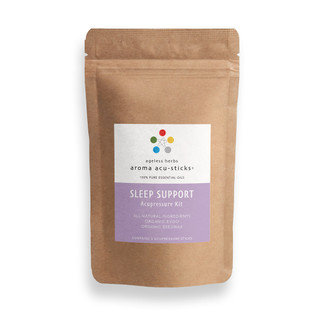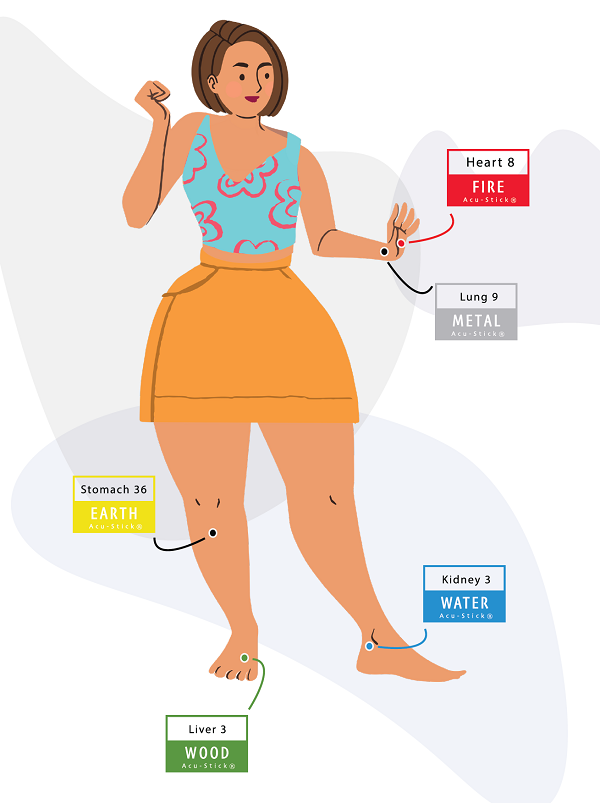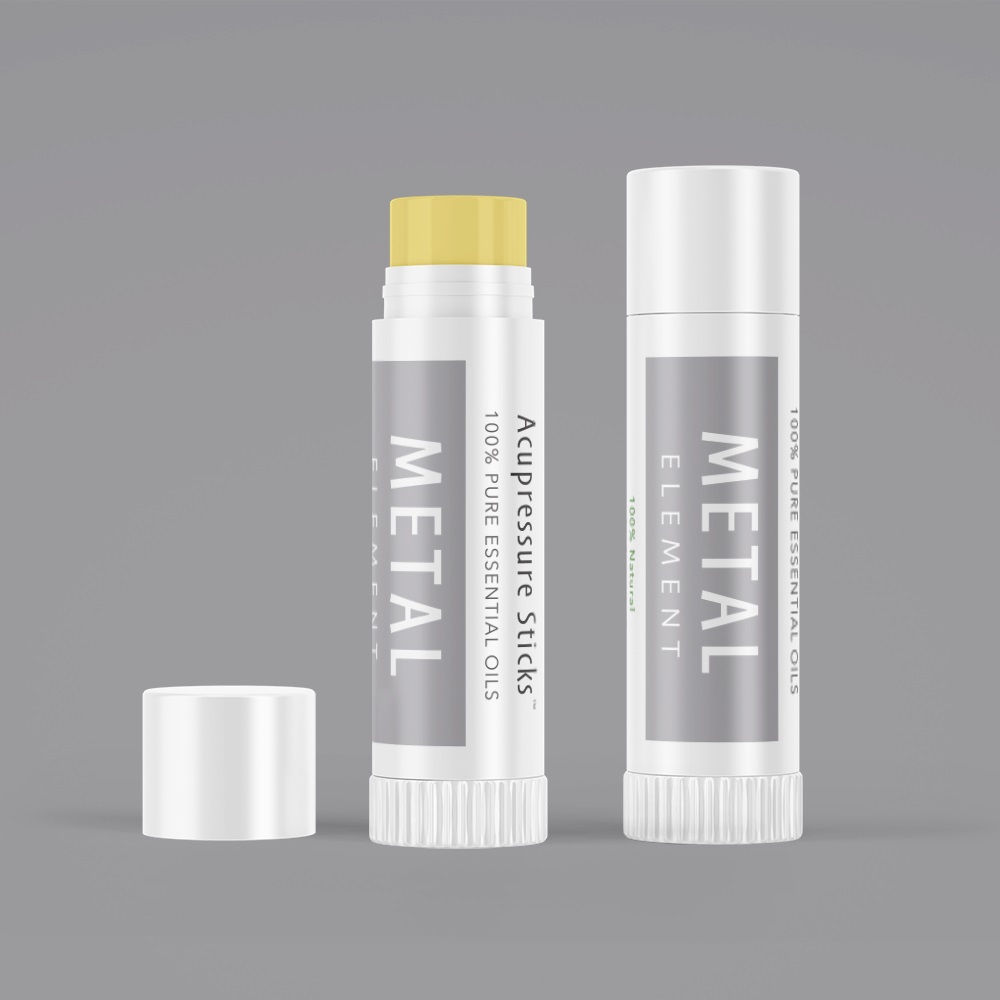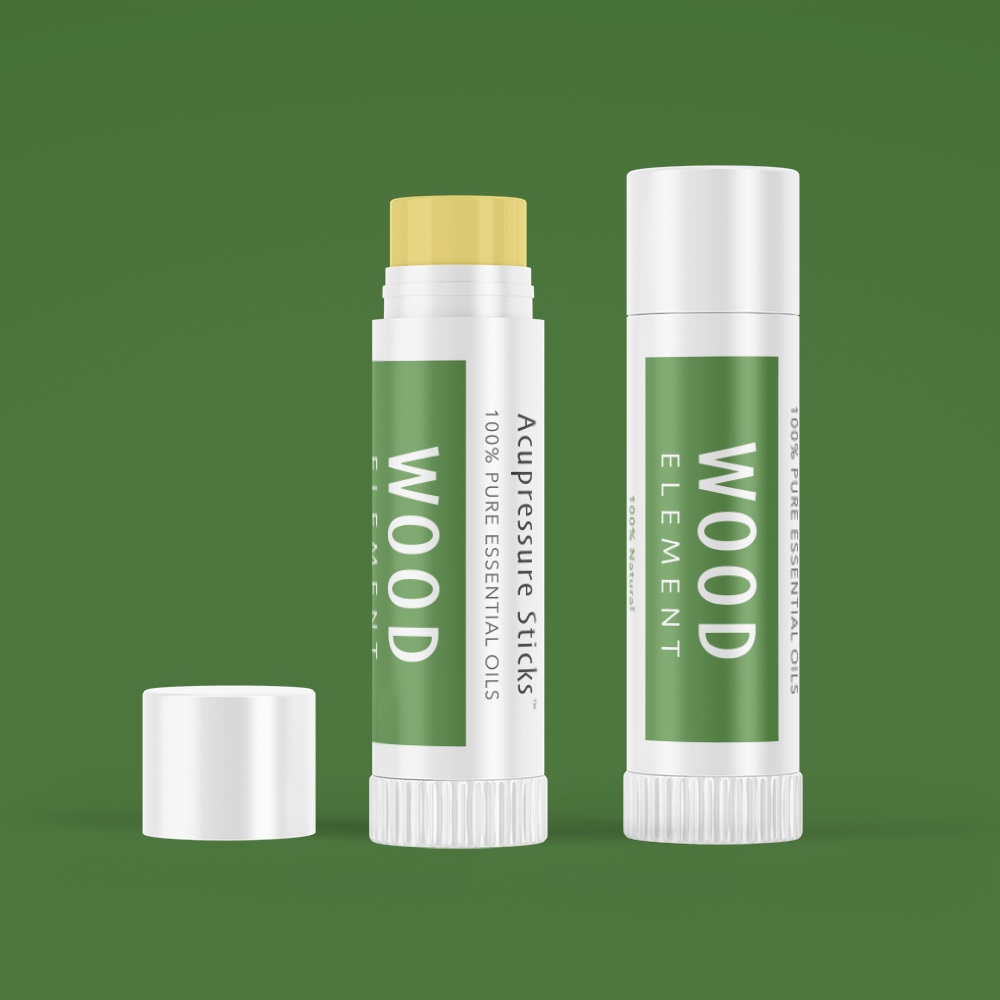Sleep Support
Sleep Issues in Chinese Medicine
As with all physical and psychological problems, Chinese medicine breaks down insomnia into many patterns of imbalance depending on how the sleep disturbances present themselves. The one basic theory that governs sleep is that the "Heart houses the Mind during sleep" and therefore insomnia typically has some element of a Fire Element Imbalance as part of the diagnosis in traditional Chinese medicine. Recent scientific research is demonstrating how a lack of sleep can negatively impact our health contributing to memory loss, pain, and immune health to name a few. For best outcomes using self-care, combine associated Aroma Acu-Sticks® to acu-points, topical remedies, and good lifestyle practices.
![]()

Aroma Acu-Therapy™ for Insomnia and Improved Sleep
Apply the Wood Element Aroma Acu-Stick® to activate Acupressure Point LV 3
Why? Acu-point Liver 3 soothes Liver Qi Stagnation that causes heat in the body that rises to the Heart and disrupts sleep patterns.
Heart 7
Apply the Fire Element Aroma Acu-Stick® to activate Acupressure Point Heart 8
Why? Acu-point HT 8 clears Heart Heat that causes insomnia and/or distressing dreams.
Apply the Water Element Aroma Acu-Stick® to activate Acupressure Point Kidney 3
Why? Acu-point KI 3 tonifies Yin of the body which can help to cool Liver and Heart Heat.
Apply the Earth Element Aroma Acu-Stick® to activate Acupressure Point ST 36
Why? Acu-point ST 36 calms the mind and promotes the production of Blood that is a Yin substance in the body that grounds the mind at night.
 Lung 9
Lung 9
Apply the Metal Element Aroma Acu-Stick® to activate Acupressure Point Lung 9
Why? Acu-point LU 9 influences Blood circulation in the Heart region by promoting Gathering Qi formation and breaking up stagnation in the chest.
Related Articles:
- How Aroma Acupressure Works
- Aroma Acu-therapy® Online Course
- Specific Acu-Point Locations
- The Five Elements of Chinese Medicine
Sleep Patterns of Imbalance According to Chinese Medicine
Insomnia and sleep disturbances can be caused by a number of different imbalances according to Chinese medicine. By using Chinese medicinal remedies an Aroma Acu-Therapy™, one can bring balance to the Energetic Organ System(s) and associated Elements for long-term relief.
Heart Blood Deficiency-Trouble Staying Asleep
There are several patterns that can be related to problems staying asleep, but the most common reason people wake through the night is Heart Blood and Kidney Yin Deficiency. Blood is a dense Yin-substance that helps to ground the mind; without sufficient Blood, the Heart is unable to contain, or ground, the mind at night. Those who suffer with more severe Heart Blood Deficiency may often find themselves waking startled and frightened. Someone who is Blood Deficient is not necessarily anemic; it simply indicates that there is not enough enriched Blood to nourish all of the organs properly. This pattern may also include palpitations, a racing heart, or a sensation of the heart. Kidney Yin Deficiency is related to adrenal insufficiencies in Chinese medicine.
![]()
Heart-Liver Imbalances Leading to Insomnia-Trouble Falling Asleep 
In Chinese medicine, the Heart plays a central role in emotional disorders and sleep pattern problems. The Heart is said to "house the mind" during sleep. Typically in Chinese medicine, trouble falling asleep points to a Heart Qi Deficiency (rather than Heart Blood Deficiency as above) or Heart Shen disorder. Often, herbs that nourish the Heart Shen (calming nervine herbs) are able to help people get to sleep.
Another disorder that is common with sleep patterns where there is trouble getting to sleep is Liver Qi Stagnation. When Liver Qi becomes congested it tends to heat up. Heat always rises, and in this case the Liver Heat attacks the Heart and prevents a person from being able to fall asleep easily. Liver Qi Stagnation would also have other signs presenting to look for such as stress, frustration, and anger to name a few.
Acupressure Point Combination Strategy:
- Apply the Fire Element Acupressure Stick to Acupressure Point Heart 7
- Apply the Wood Element Acupressure Stick to Acupressure Point Liver 3
- Apply the Meditation Acupressure Stick to Acupressure Point Yin Tang
- Apply the Meditation Acupressure Stick to Acupressure Point Ren 17
Chronic Stress and Insomnia
A major contributor to insomnia, stress, weakens the function of the Liver, which in turn affects the health of your nerves. According to the 5 Element Theory, the relationship between the Liver and nervous system flows both ways, causing the function of the Liver to be weakened from the accumulation of things that "get on your nerves." Stress-related insomnia can also be accompanied by another nerve-induced problem; restless leg syndrome. This can make bedtime even more of a battle for sleep. When your Liver is unbalanced and being asked to deliver energy it does not have, uncomfortable symptoms are your body's way of signaling the need to get things back into harmony. Herbs can have a calming effect on the nervous system.
Acupressure Point Combination Strategy:
- Apply the Wood Element Acupressure Stick to Acupressure Point Liver 3
- Apply the Metal Element Acupressure Stick to Acupressure Point Large Intestine 4
- Apply the Earth Element Acupressure Stick to Acupressure Point Stomach 36
- Apply the Fire Element Acupressure Stick to Acupressure Point Yin Tang
- Apply the Fire Element Acupressure Stick to Acupressure Point Heart 7
- Apply the Meditation Acupressure Stick to Acupressure Point Yin Tang
- Apply the Meditation Acupressure Stick to Acupressure Point Ren 1
Waking at 3 AM
Many people fall in to a pattern of waking at 3 AM, almost like clockwork. This is typically an indication of Liver Qi Stagnation. A pattern of Liver Qi Stagnation will include several of the common indications seen with Liver Qi Stagnation or Wood Imbalances.
Acupressure Point Combination Strategy:
- Apply the Fire Element Acupressure Stick to Acupressure Point Heart 7
- Apply the Wood Element Acupressure Stick to Acupressure Point Liver 3
Dream Disturbed Sleep
Dreams are normal, but when dreams are so active that you wake un-rested it indicates an imbalance typically due to Heart Heat. This can be produced from Liver Qi Stagnation causing Liver Fire to rise, often consuming Heart Blood and Yin. Frightening dreams are often attributed to an imbalance of the Wood Element and the Heart. With this type of insomnia, there may also be signs of Liver Qi Stagnation such as stress, frustration, anger, PMS, acid reflux, arthritis, or lack of motivation. Acid reflux in itself can often disturb sleep pattern.
Acupressure Point Combination Strategy:
- Apply the Fire Element Acupressure Stick to Acupressure Point Heart 8
- Apply the Water Element Acupressure Stick to Acupressure Point Kidney 3
- Apply the Wood Element Acupressure Stick to Acupressure Point Liver 2
- Apply the Meditation Acupressure Stick to Acupressure Point Yin Tang
- Apply the Meditation Acupressure Stick to Acupressure Point Ren 17
Internal Wind Causing Restless Leg Syndrome and Insomnia
 Many people lose sleep because of the jerking motion that is caused with RLS. In Chinese medicine, Restless Leg Syndrome is typically due to Internal Wind caused by Liver Qi Stagnation.
Many people lose sleep because of the jerking motion that is caused with RLS. In Chinese medicine, Restless Leg Syndrome is typically due to Internal Wind caused by Liver Qi Stagnation.
Related Article: Understanding the Meaning of Internal Wind in Chinese Medicine
- Apply the Wood Element Acupressure Stick to Acupressure Point Gallbladder 41
- Apply the Wood Element Acupressure Stick to Acupressure Point Liver 3
![]()
Heart-Spleen Imbalances Causing Sleeping Difficulties
Often, the mind is over active and does not allow for sound sleep. When over thinking and mulling over issues prevents sleep, Spleen imbalances and Heart Shen disturbances would be indicated. This type of insomnia may also contain signs of Spleen Deficiency and Dampness, such as having trouble waking up in the morning and a feeling of heaviness. Pain due to Internal Dampness is deep and achy and is more apparent with humid or damp weather/conditions.
Acupressure Point Combination Strategy:
- Apply the Fire Element Acupressure Stick to Acupressure Point Pericardium 6
- Apply the Earth Element Acupressure Stick to Acupressure Point Spleen 3
- Apply the Earth Element Acupressure Stick to Acupressure Point Stomach 40
- Apply the Earth Element Acupressure Stick to Acupressure Point Spleen 9
- Apply the Meditation Acupressure Stick to Acupressure Point Yin Tang
- Apply the Meditation Acupressure Stick to Acupressure Point Ren 17
Sleep Apnea and Chinese Medicine
While sleep apnea is not one of those conditions that you would want to exclusively treat on your own, it is a condition that indicates a Heart Shen disorder most often complicated by Internal Dampness.
Acupressure Point Combination Strategy:
- Apply the Fire Element Acupressure Stick to Acupressure Point Pericardium 6
- Apply the Earth Element Acupressure Stick to Acupressure Point Spleen 3
- Apply the Earth Element Acupressure Stick to Acupressure Point Stomach 40
- Apply the Earth Element Acupressure Stick to Acupressure Point Spleen 9
![]()
Kidney Yin Deficient Night Terrors
The Kidney energetic organ system of Chinese medicine belongs to the Water Element and is related to the emotion fear. When fear-driven dreams result in abrupt sleep disruption waking in a cold sweat this would indicate Kidney Yin Deficiency.
Acupressure Point Combination Strategy:
- Apply the Fire Element Acupressure Stick to Acupressure Point Heart 7
- Apply the Water Element Acupressure Stick to Acupressure Point Kidney 3
- Apply the Earth Element Acupressure Stick to Acupressure Point Stomach 36
- Apply the Earth Element Acupressure Stick to Acupressure Point Spleen 3
- Apply the Metal Element Acupressure Stick to Acupressure Point Lung 9
Meditation for Better Sleep
Recent scientific research has concluded that regular meditation can benefit those with chronic insomnia (https://pubmed.ncbi.nlm.nih.gov/30575050/). This guided meditation is perfect for those who are new to meditation or who have struggled with meditation efforts in the past. Use the meditation during the day and 30 minutes before bedtime.
Acupressure Point Combination Strategy for Focused Meditation:
- Apply the Fire Element Acupressure Stick to Acupressure Point Heart 7
- Apply the Meditation Acupressure Stick to Acupressure Point Yin Tang
- Apply the Meditation Acupressure Stick to Acupressure Point Ren 17
![]()
Chinese Medicine and Insomnia
The inability to sleep soundly throughout the night is considered abnormal in Chinese medicine, even if it is not diagnosed as full-blown insomnia. One of the reasons that Chinese medicine is able to address insomnia with such great success is because it has a number of practical theories that actually address the root causes of sleep disorders; however, there are some basic concepts that must be understood before you will be able to identify what the cause is of your particular sleep problem and address it correctly:
- It should be noted that in Chinese medicine a normal pattern of sleep would be the ability to fall asleep on your own around 10 or 11 PM, and stay asleep for 7-8 hours without interruption. Other sleep pattern would be considered abnormal and would likely be part of a pattern of imbalance. The natural order of the universe dictates that day and belongs to Yang and night belongs to Yin.
- It is important to understand that the concept of the Organs in traditional Chinese medicine is radically different from that of contemporary western medicine. Understanding this difference is very important because the physiology and pathology of the energetic organ systems in TCM is fundamental to the understanding and treatment of disease.
- In Chinese medicine, everything in the body is interrelated, and an imbalance in one organ system will begin to have an impact all other organ systems over time.
Insomnia may have a number of causes including stress, depression or anxiety; irregular work schedules; medications, drug or alcohol abuse; major life changes; chronic pain, hyperthyroidism or arthritis. Working the late shift or the night shift is highly discouraged in Chinese medicine as it can disrupt the natural cycles of the body necessary for true health and wellness.
True insomnia is more than tossing and turning. It's more serious than an inability to fall asleep early. Never the less, in Chinese medicine, all of these conditions are seen as abnormal sleep patterns that should be addressed as the effects can be debilitating over time. An estimated 32 million people suffer from insomnia in the U.S., and sleep medications have been shown to have risks of detrimental side effects.
Insomnia presents itself in many different forms. For some, the inability to fall asleep is the most noticeable insomnia symptom. Others are unable to reach a deep level of sleep and are startled awake by every noise. Any insomnia symptom would frustrate most sleepers, but night after night for months or years, the most serious issues of insomnia accumulate and manifest as detrimental daytime effects. These can include physical tiredness, difficulty concentrating, and feeling depressed, irritable or lethargic. While these are standard symptoms of a poor night's sleep, they are magnified by chronic conditions and can have severe negative setbacks in a person's life. True insomnia is defined as poor sleep followed by daytime fatigue. Because sleep needs vary from person to person, the real issue of insomnia is quality of feeling during the day. The actual pattern of sleep disturbance helps to determine a course of treatment according to Chinese medicine.
![]()
Non-pharmacological interventions for sleep promotion in the intensive care unit
Effects of Acupressure Therapy on Stress and Sleep Disturbance of Middle-Aged Women
Besedovsky L, Lange T, Haack M. The Sleep-Immune Crosstalk in Health and Disease. Physiol Rev. 2019;99(3):1325–1380. doi:10.1152/physrev.00010.2018
Klinzing JG, Niethard N, Born J. Mechanisms of systems memory consolidation during sleep [published correction appears in Nat Neurosci. 2019 Sep 11;:]. Nat Neurosci. 2019;22(10):1598–1610. doi:10.1038/s41593-019-0467-3
Irwin MR. Sleep and inflammation: partners in sickness and in health. Nat Rev Immunol. 2019;19(11):702–715. doi:10.1038/s41577-019-0190-z
This information has not been evaluated by the Food and Drug Administration. This information is not intended to diagnose, treat, cure, or prevent any disease.




